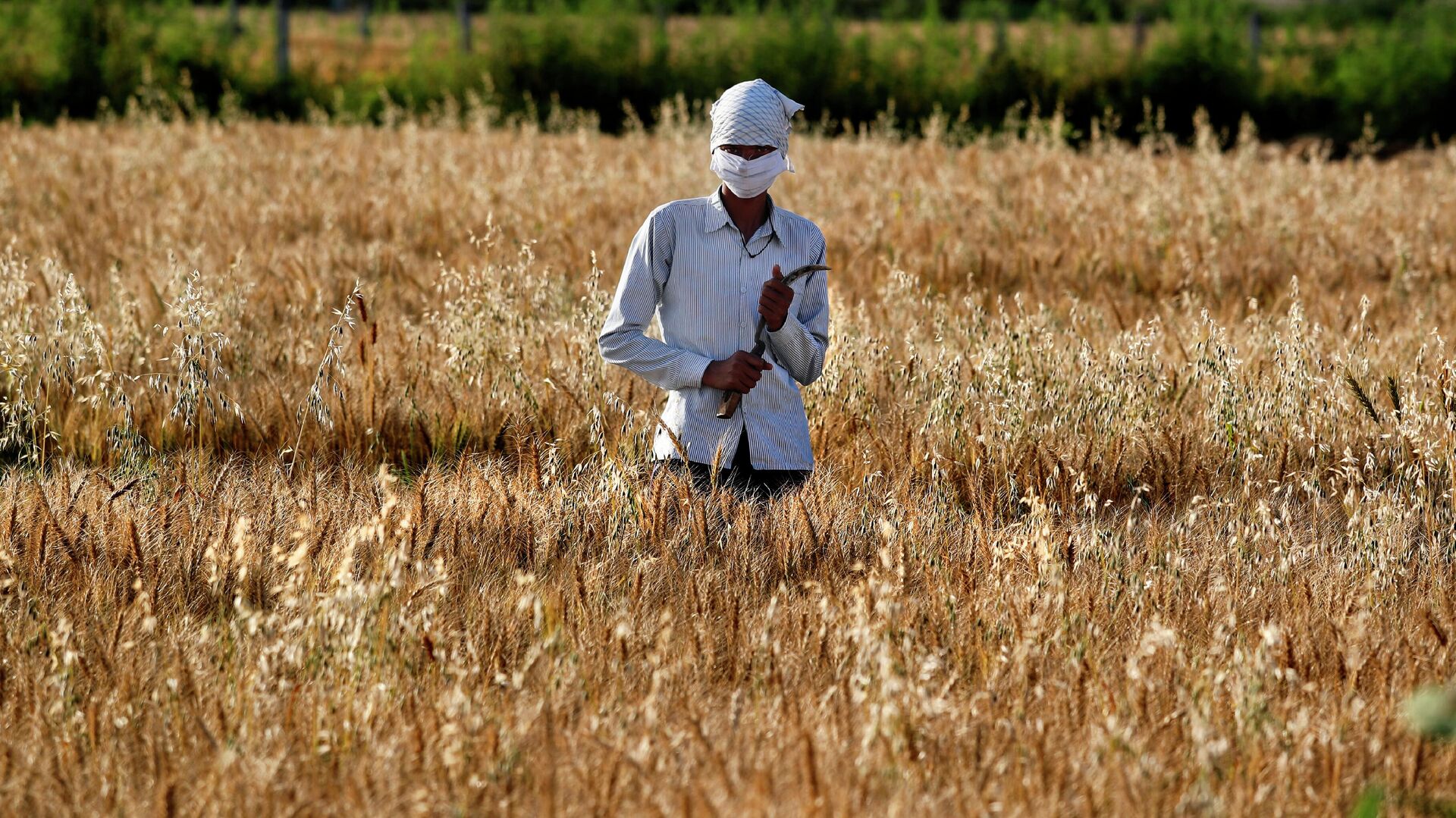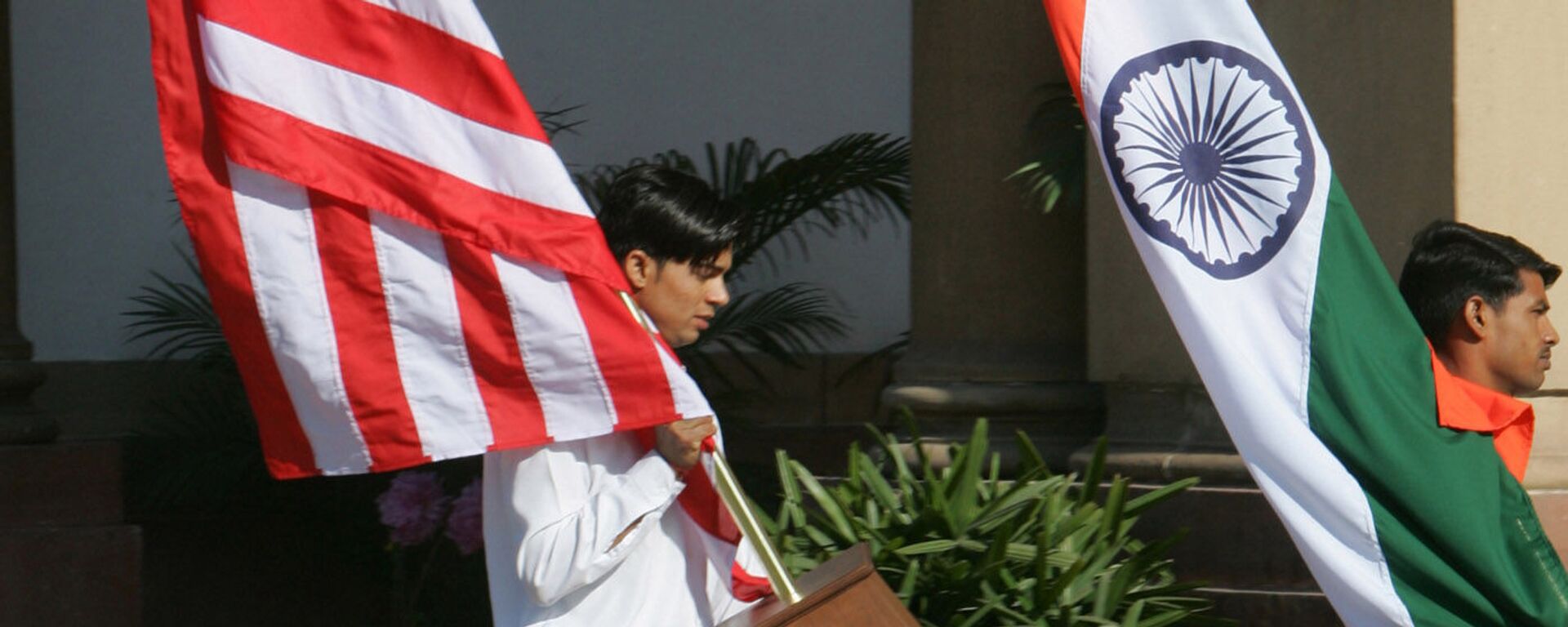https://sputnikglobe.com/20220519/india-slams-wests-criticism-for-wheat-ban-reminds-of-covid-vaccines-discrimination--1095621968.html
India Slams West's Criticism For Wheat Ban, Reminds Of COVID Vaccines' 'Discrimination'
India Slams West's Criticism For Wheat Ban, Reminds Of COVID Vaccines' 'Discrimination'
Sputnik International
India’s curbs on wheat exports haven’t gone down well with the US and other members of the G7 advanced economies, who have asked New Delhi to “reconsider” its... 19.05.2022, Sputnik International
2022-05-19T09:30+0000
2022-05-19T09:30+0000
2023-04-12T17:14+0000
wheat
food security
us
g7
ukraine
russia
the united nations (un)
european union (eu)
https://cdn1.img.sputnikglobe.com/img/07e6/05/13/1095626798_287:0:3928:2048_1920x0_80_0_0_bb21342cb35f2e52c7d33102a5a7146d.jpg
India's Union Minister of State (MoS) for External Affairs Vellamvelly Muraleedharan has staunchly defended New Delhi’s restrictions on the export of wheat which kicked in on 13 May. The minister reminded the US and western allies of the contentious role they had played in stockpiling millions of doses of COVID vaccines last year when there was a crippling shortage of jabs in the developing nations of Asia and Africa.Global wheat prices have spiked by more than 40 percent as a result of the Ukraine crisis. Ukraine and Russia together accounted for more than 30 percent of the global wheat supply before the start of Moscow's special military operation on 24 February. India is the second-largest producer of wheat in the world but its crops have suffered because the wheat-growing areas of the country suffered the hottest March on record in 122 years. Consequently, India's Commerce Ministry announced an "amendment" to the country's export policy on wheat on 13 May, that would "prohibit" exports to foreign countries for the sake of national "food security" and amid a "sudden spike in global prices".In a press release issued by the Indian embassy in Germany on 14 May, New Delhi clarified the amendment to its export policy would “not apply” in cases where “prior commitments” have been made by private players, as well as in cases where “permission has been granted” by the government to meet the “food security needs” of other countries.He added that India would still export food grains to countries which need them to “meet their food security demands”.Further, Muraleedharan called upon the global community to “appreciate adequately the importance of equity, affordability and accessibility when it comes to food grains”.In India, which faced a devastating second COVID wave in April-June period last year, the US’ apparent reluctance to release vaccines didn’t go down well with many people. Politicians from across the spectrum in India, as well as foreign policy observers, have accused the Biden administration of “undermining” the US-India strategic partnership by not exporting vaccines to India.“As for our track record of helping our partners in distress, even in the middle of the COVID-19 pandemic and ongoing conflicts, India has never been found wanting,” he said, adding that New Delhi has exported thousands of tonnes of wheat, rice, pulses and lentils to its neighbouring nations as well as to those in Africa.“We are also helping Sri Lanka, including with food assistance, during these difficult times,” he told the UN.Before India's export restrictions kicked in, New Delhi had set-up export targets for the ongoing year to 10 million tonnes from the seven million tonnes (approximately) it exported last year.However, the South Asian nation faced its hottest March in 122 years, a factor which affected the crop and led to an overall slump in the produce.
https://sputnikglobe.com/20210424/selfish-us-hurting-ties-with-india-by-denying-raw-materials-covid-vaccines-ex-foreign-secretary-1082705095.html
ukraine
Sputnik International
feedback@sputniknews.com
+74956456601
MIA „Rosiya Segodnya“
2022
News
en_EN
Sputnik International
feedback@sputniknews.com
+74956456601
MIA „Rosiya Segodnya“
Sputnik International
feedback@sputniknews.com
+74956456601
MIA „Rosiya Segodnya“
wheat, food security, us, g7, ukraine, the united nations (un), european union (eu)
wheat, food security, us, g7, ukraine, the united nations (un), european union (eu)
India Slams West's Criticism For Wheat Ban, Reminds Of COVID Vaccines' 'Discrimination'
09:30 GMT 19.05.2022 (Updated: 17:14 GMT 12.04.2023) India’s curbs on wheat exports haven’t gone down well with the US and other members of the G7 advanced economies, who have asked New Delhi to “reconsider” its restrictions. Although Washington has said it is “deeply concerned” by New Delhi’s position, Germany has claimed that the curbs by India could “worsen” the global food security crisis.
India's Union Minister of State (MoS) for External Affairs Vellamvelly Muraleedharan has staunchly defended New Delhi’s restrictions on the export of wheat which kicked in on 13 May.
The minister reminded the
US and western allies of the contentious role they had played in stockpiling millions of doses of COVID vaccines last year when there was a crippling shortage of jabs in the developing nations of Asia and Africa.
Speaking at the United Nations (UN) at the Global Food Security Call to Action, Muraleedharan said: “India remains strongly committed to the cause of global food security.” The debate was convened at the behest of the US to discuss the link between the conflict in Ukraine and food security. It was chaired by US Secretary of State, Antony Blinken.
Global wheat prices have spiked by more than 40 percent as a result of the Ukraine crisis. Ukraine and Russia together accounted for more than 30 percent of the global wheat supply before the start of Moscow's special military operation on 24 February.
India is the second-largest producer of wheat in the world but its crops have suffered because the wheat-growing areas of the country suffered the hottest March on record in 122 years. Consequently, India's Commerce Ministry announced an "amendment" to the country's export policy on wheat on 13 May, that would "prohibit" exports to foreign countries for the sake of national "food security" and amid a "sudden spike in global prices".
In a press release issued by the Indian embassy in Germany on 14 May, New Delhi clarified the amendment to its export policy would “not apply” in cases where “prior commitments” have been made by private players, as well as in cases where “permission has been granted” by the government to meet the “food security needs” of other countries.
“To manage our own overall food security and support the needs of neighbouring and other vulnerable developing countries, we have announced some measures regarding wheat exports on 13 May 2022,” Muraleedharan said.
He added that India would still export food grains to countries which need them to “meet their food security demands”.
“This will be done at the request from the concerned governments. Such a policy will ensure that we will truly respond to those who are most in need,” the Indian minister said.
Further, Muraleedharan called upon the global community to “appreciate adequately the importance of equity, affordability and accessibility when it comes to food grains”.
He warned against creating a situation similar to the “case of COVID vaccines” last year, when advanced economies such as the US and the European Union (EU) stockpiled millions of doses of surplus vaccine while many low and middle-income nations suffered a shortage of inoculations.
In India, which faced a devastating second COVID wave in April-June period last year, the US’ apparent reluctance to release vaccines didn’t go down well with many people.
Politicians from across the spectrum in India, as well as foreign policy observers, have accused the Biden administration of “
undermining” the US-India strategic partnership by not exporting vaccines to India.
“We have already seen to our great cost how these principles were disregarded in the case of COVID-19 vaccines. Open markets must not become an argument to perpetuate inequity and promote discrimination,” Muraleedharan said.
“As for our track record of helping our partners in distress, even in the middle of the COVID-19 pandemic and ongoing conflicts, India has never been found wanting,” he said, adding that New Delhi has exported thousands of tonnes of wheat, rice, pulses and lentils to its neighbouring nations as well as to those in Africa.
Muraleedharan also recalled that New Delhi was in the process of donating 50,000 metric tonnes of wheat to Afghanistan and was also involved in supporting Myanmar with a grant of 10,000 tonnes of food grains and rice.
“We are also helping Sri Lanka, including with food assistance, during these difficult times,” he told the UN.
Before India's export restrictions kicked in, New Delhi had set-up
export targets for the ongoing year to 10 million tonnes from the seven million tonnes (approximately) it exported last year.
However, the South Asian nation faced its hottest March in 122 years, a factor which affected the crop and led to an overall slump in the produce.





